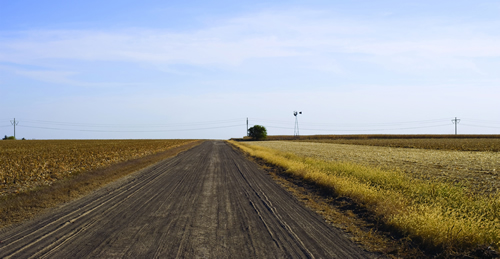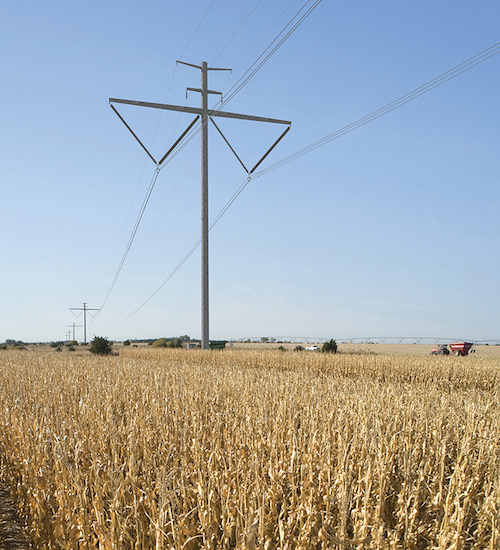The Illinois Supreme Court has agreed to hear a case that
might
decide
the fate of the Rock Island Clean Line,
a 500-mile wind energy transmission
line that could lead to thousands of jobs in Iowa and Illinois, many of them
for IBEW members.

|
An artist's description of the lines for the proposed Rock Island Clean Line.
Photo submitted by Clean Line Energy Partners.
|
A state appellate court ruling in August reversed an earlier
decision by the Illinois Commerce Commission that gave Clean Line Energy
Partners permission to build the project, saying the company did not meet the state’s
definition of a public utility.
The Supreme Court will hear the appeal sometime after it
reconvenes in January.
Several
Illinois locals were among the parties that asked the court to review the case,
including Chicago Local 9, Springfield Local 51, Rock Island Local 145 and
Rockford Local 196.
“If we’re going to have a clean environment, we’re going to
need wind,” International Representative for Business Development John Bourne
said. “And to create wind power, we’re going to have to have it up and down the
center of the United States.”
Both Bourne and IBEW Director of Business Development Ray
Kasmark have worked closely with Clean Line Energy officials and officials from
Illinois and Iowa since the Rock Island Line was proposed in 2012. An economic
study estimates the project will generate
about
630 permanent jobs in the two states and more than 5,000 temporary jobs during
the three-year construction period.
“Without
the support of members in the Sixth and Eleventh districts signing petitions,
attending hearings and talking to their elected officials, we could not have
gotten this far,” Kasmark said. “We also want to thank Illinois Locals 9, 51,
145 and 196 for standing up and asking the Supreme Court to hear this case. We
certainly appreciate their leadership.”
Sources for wind power are most plentiful in the Midwest and
Great Plains. Iowa and Illinois
rank
second and fifth respectively
among the states in installed wind power
capacity.
The Rock
Island Clean Line
would build on that trend, transmitting wind energy from
northwest Iowa to Illinois’ Grundy County, about 65 miles southwest of Chicago.

|
An artist's depiction of what the towers supporting the transmission lines will look like for the proposed Rock Island Clean Line.
Submitted by Clean Line Energy Partners.
|
Clean Line Energy
Partners, a privately-owned company based in Houston, received commission
approval by a 5-0 vote in 2014. Supporters noted it was a step toward Illinois
meeting its goal of having 25 percent of its energy needs supplied by
renewables by 2025.
But a consortium of groups filed suit, led by Illinois Farm
Bureau and some landowners along the proposed route, arguing state law
permitted only public utility companies from developing new power lines.
They also argued a privately-held company like Clean Line
Energy has no legal ground to acquire land along the transmission line routes
via eminent domain – the right of a governmental body to take or purchase
public property for a public good.
Illinois’
Third District Court of Appeals agreed by a 3-0 vote.
Both Bourne and Kasmark say they are sympathetic to the concerns
of landowners, but the 150-foot tall towers and power lines that Clean Line
Energy is proposing to build will take up much less space than the many wind
turbines seen throughout the Midwest on private farm land, they said.
The $2 billion project will be paid for by private
investors, not ratepayers. Backers say about $600 million of the project is
expected to be spent in Illinois,
where
Clean Line has agreed to pay each county the line passes through $7,000 per
mile for the next 20 years.
“With the existing situation because of deregulation, there’s
not one utility that is going to put a line in like this,” Kasmark said. “They’re
not going to invest this kind of money. This is basically a private toll road
that will get the wind energy to market.”
Clean Line Energy Vice President Hans Detweiler told the
Chicago Tribune he hopes the Illinois Supreme Court “will recognize that
privately funded infrastructure products … serve a public purpose.”
Bourne noted the project also has the support of such
disparate interests as the Illinois Chamber of Commerce and the state’s chapter
of the Sierra Club – who both have noted the potential for cleaner energy at
cheaper prices.
A byproduct of the Illinois high court’s involvement is that
it may clarify the status of the Grain Belt Express, a 770-mile line scheduled
to run through Kansas, Missouri, Illinois and Indiana that Clean Line also
plans to develop, Kasmark said.